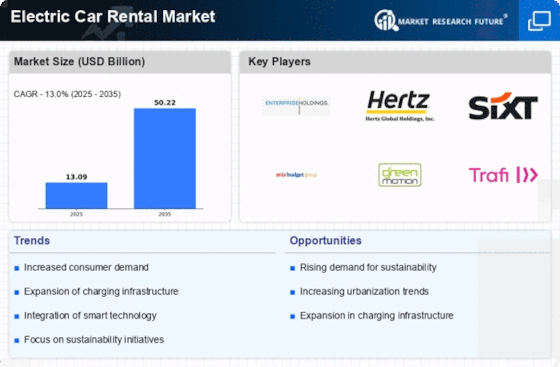Top Industry Leaders in the Electric Car Rental Market
*Disclaimer: List of key companies in no particular order
The electric car rental market is accelerating, driven by a surge in environmental consciousness, escalating fuel prices, and technological advancements. In this burgeoning arena, a clash of titans and nimble startups is reshaping the competitive landscape as companies vie for supremacy in this eco-conscious space.
Key Players & Their Strategies: Giants and Disruptors
Prominent players include:
- The Hertz Corporation
- Zoomcar
- Enterprise Holdings Inc.
- Drive Electric
- Green Motor International
- Avis Budget Group, Inc.
- Zipcar
- Europcar Group
- Blueindy
- Wattacars, among others.
Traditional Rental Giants: Industry giants like Hertz, Avis, and Enterprise leverage their expansive networks and brand recognition to introduce electric vehicle (EV) fleets. Hertz, for instance, solidified its European presence by acquiring EV rental company UFODrive. These giants prioritize partnerships with automakers and charging infrastructure providers to ensure fleet availability and seamless charging experiences.
Emerging Mobility Startups: Disruptors like Zipcar, Turo, and Getaround are reshaping the market with peer-to-peer models, offering diverse EV models through car-sharing platforms. Their emphasis on flexibility, affordability, and technology-driven booking systems appeals to tech-savvy customers. Zipcar's collaboration with Hertz further blurs the lines between traditional and peer-to-peer segments.
Luxury EV Rentals: Catering to a niche market, Sixt and Driven Sports Cars provide premium electric vehicles like Teslas and Porsches. They offer concierge services and curated driving experiences, capitalizing on the growing demand for sustainable luxury travel.
Factors for Market Share Analysis: Unraveling the Dynamics
Several factors influence market share analysis:
-
Fleet Size and Diversity: The number and variety of EV models offered significantly impact market share, catering to diverse customer needs and trip lengths. -
Geographic Reach and Network Density: Broader geographic coverage and a denser network of charging stations attract customers seeking convenience and accessibility. -
Pricing Strategies and Subscription Models: Competitive pricing, attractive rental packages, and innovative subscription models influence customer choice and market share. -
Technology and Customer Experience: Seamless online booking platforms, mobile apps, and integration with charging infrastructure provide a superior customer experience and drive brand loyalty. -
Sustainability Initiatives and Partnerships: Commitment to carbon neutrality, investments in renewable energy sources, and partnerships with sustainability-focused organizations attract environmentally conscious customers.
New & Emerging Trends: Paving the Way Forward
Several trends shape the competitive landscape:
-
Subscription-based EV rental models: Flexible, long-term rental options with inclusive charging and maintenance eliminate purchase anxieties and foster customer loyalty. -
Focus on specific use cases: Tailoring offerings to specific needs, such as electric car rentals for city commutes or weekend getaways. -
Collaboration with ride-hailing platforms: Integrating EV fleets with ride-hailing apps expands reach and provides customers with broader mobility options. -
Electrification of commercial fleets: Partnerships with businesses for EV rentals for corporate travel and employee commutes offer significant growth potential. -
Focus on charging infrastructure: Direct investments in charging stations or partnerships with charging providers ensure convenience and reduce range anxiety for customers.
Overall Competitive Scenario: Navigating the Terrain
The electric car rental market witnesses a dynamic interplay between established players adapting to the EV revolution and innovative startups challenging the status quo. Competition is fierce, with companies continuously developing strategies to differentiate themselves. Success hinges on offering diverse EV fleets, seamless customer experiences, competitive pricing models, and a commitment to environmental sustainability. Partnerships, technological advancements, and a keen understanding of evolving customer needs are crucial for navigating this rapidly evolving landscape.
While traditional rental giants hold an initial advantage due to their established networks and brand recognition, nimble startups with technology-driven solutions and niche-focused offerings can quickly gain traction. As the market matures, expect further consolidation, strategic partnerships, and the emergence of new business models that reshape the future of electric car rentals.
Industry Developments and Latest Updates:
The Hertz Corporation:
- Date: December 15, 2023
- Source: Hertz Press Release
- *News: Hertz announces a partnership with Uber to offer Tesla Model 3 rentals at select airports in the US, aiming to provide Uber drivers with access to affordable and reliable electric vehicles.
Zoomcar:
- Date: December 19, 2023
- Source: Zoomcar Blog
- *News: Zoomcar launches a subscription service for electric vehicles in Bangalore and Mumbai, offering flexible plans with doorstep delivery and maintenance included.
Enterprise Holdings Inc.:
- Date: December 12, 2023
- Source: Enterprise Holdings website
- *News: Enterprise expands its electric vehicle rental fleet with the addition of 500 Nissan Leaf cars across North America.
Drive Electric:
- Date: December 20, 2023
- Source: Drive Electric Facebook Page
- *News: Drive Electric opens a new charging station in San Francisco, offering fast-charging for electric rental cars.
Green Motor International:
- Date: December 18, 2023
- Source: Green Motor International Press Release
- News: Green Motor partners with Europcar to offer electric car rentals in major European cities, aiming to expand access to electric vehicles for tourists and business travelers.










